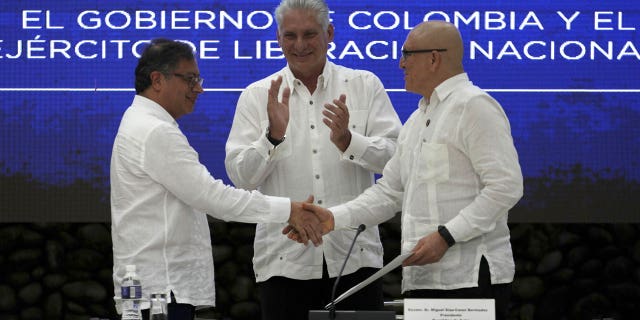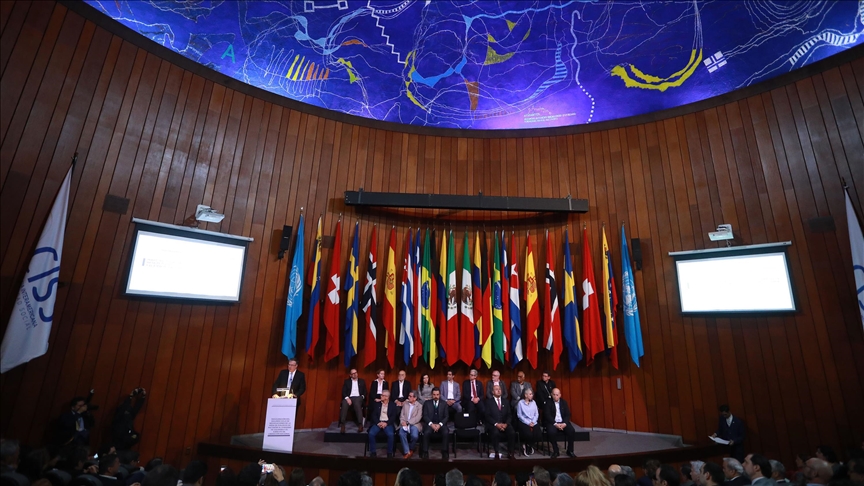Ceasefire with National Liberation Army to be phased in over time
Colombia’s government and its largest remaining guerrilla group agreed Friday to a six-month cease-fire at talks in Cuba, in the latest attempt to resolve a conflict dating back to the 1960s.
The government and the National Liberation Army, or ELN, announced the accord at a ceremony in Havana attended by Colombian President Gustavo Petro, top guerrilla commander Antonio García and Cuban officials. The cease-fire takes effect in phases, goes fully into effect in August and then lasts for six months.
"This effort to look for peace is a beacon of hope that conflicts can be resolved politically and diplomatically," top rebel negotiator Pablo Beltrán said at the ceremony.
The talks originally were scheduled to conclude with an official ceremony on Thursday, but were postponed as the parties asked for additional time to work on final details. Petro traveled to the island for the ceremony, saying it could herald an "era of peace" in Colombia.
The accord reached Friday also calls for the formation of a broadly representative national committee by late July to discuss a lasting peace.
"You have here proposed a bilateral agreement, and I agree with that, but Colombian society has to be able debate it, and to participate," Petro said during the ceremony.
García, the rebel commander, said his group was "very confident" in the accord, though he characterized it as "procedural" and not yet the "substantial" kind needed "for Colombia to change."

The Colombian government has agreed to a six-month ceasefire with the National Liberation Army, its largest remaining guerrilla group. (AP Photo/Ramon Espinosa)
Negotiations between the sides had resumed in August, after being terminated in 2019 when the rebels set off a car bomb at a police academy in Bogotá, killing 21 people.
Following that incident, the government of then-President Iván Duque (2018-2022) issued arrest warrants for ELN leaders in Cuba for the peace negotiations. But Cuba refused to extradite them, arguing that doing so would compromise its status as a neutral nation in the conflict and break with diplomatic protocols.
Talks relaunched in November shortly after Petro was elected as Colombia’s first leftist president.
Petro has pushed for what he calls a "total peace" that would demobilize all of the country’s remaining rebel groups as well as its drug trafficking gangs. He has questioned whether senior ELN leaders have full control of a younger generation of commanders who he has suggested are focused more on the illegal drug trade than on political goals.
The ELN was founded in the 1960s by union leaders, students and priests inspired by the Cuban revolution. It is Colombia’s largest remaining rebel group and has been notoriously difficult for previous Colombian governments to negotiate with.
In 2016, Colombia’s government signed a peace deal with the larger FARC group that ended five decades of conflict in which an estimated 260,000 people were killed.
But violence has continued to affect rural pockets of the country where the ELN has been active, along with FARC holdout groups and drug trafficking gangs. Colombian authorities have accused the ELN of involvement in the drug trafficking, but the group’s top leaders have denied that.
Colombian government, ELN rebels sign ceasefire: what you need to know
Deal will take effect Aug. 3, last 180 days
Laura Gamba Fadul |10.06.2023 -

BOGOTA, Colombia
The third round of peace negotiations between the Colombian government and the National Liberation Army (ELN) guerrilla group ended Friday with an agreement on a cease-fire, the main point on the agenda in talks in Havana.
Colombian President Gustavo Petro and ELN top commander Antonio Garcia signed the agreement after several failed attempts to reach an agreement.
When will it take effect?
On July 6, offensive operations will cease following a preparatory process that will take place from June 9 to July 5. The official national cease-fire will take effect Aug. 3 and last six months.
How far along and how far to go?
The parties have completed three rounds of talks since January. The talks began in Caracas, Venezuela with the second round in Mexico City. The third round in Havana began May 2. The next round will be in September in Venezuela.
The peace process has suffered various setbacks, including Petro´s announcement Dec. 31 of a six-month cease-fire with the ELN and other armed groups -- a claim that was denied by the guerrilla group.
Who will monitor the process?
The agreement will be closely monitored and verified by the UN, Catholic Church, guarantor countries and civil society delegates.
What does agreement include?
Although the deal suspends hostilities between military forces and the ELN, it does not halt criminal actions by the guerrillas such as extortion and kidnapping.
ELN chief negotiator Pablo Beltran said Friday that the guerrillas' "finance operations" will be maintained "for now" and for kidnappings, or “retentions” as they are called by the ELN, "if they are not necessary, they will not happen."
The government has not commented on that issue, which has generated controversy among leaders in Colombia's regions, who said excluding those behaviors from the agreement will increase criminal activity.
Petro said he plans to end the decades-long war with the ELN in May 2025.
Deal will take effect Aug. 3, last 180 days
Laura Gamba Fadul |10.06.2023 -

BOGOTA, Colombia
The third round of peace negotiations between the Colombian government and the National Liberation Army (ELN) guerrilla group ended Friday with an agreement on a cease-fire, the main point on the agenda in talks in Havana.
Colombian President Gustavo Petro and ELN top commander Antonio Garcia signed the agreement after several failed attempts to reach an agreement.
When will it take effect?
On July 6, offensive operations will cease following a preparatory process that will take place from June 9 to July 5. The official national cease-fire will take effect Aug. 3 and last six months.
How far along and how far to go?
The parties have completed three rounds of talks since January. The talks began in Caracas, Venezuela with the second round in Mexico City. The third round in Havana began May 2. The next round will be in September in Venezuela.
The peace process has suffered various setbacks, including Petro´s announcement Dec. 31 of a six-month cease-fire with the ELN and other armed groups -- a claim that was denied by the guerrilla group.
Who will monitor the process?
The agreement will be closely monitored and verified by the UN, Catholic Church, guarantor countries and civil society delegates.
What does agreement include?
Although the deal suspends hostilities between military forces and the ELN, it does not halt criminal actions by the guerrillas such as extortion and kidnapping.
ELN chief negotiator Pablo Beltran said Friday that the guerrillas' "finance operations" will be maintained "for now" and for kidnappings, or “retentions” as they are called by the ELN, "if they are not necessary, they will not happen."
The government has not commented on that issue, which has generated controversy among leaders in Colombia's regions, who said excluding those behaviors from the agreement will increase criminal activity.
Petro said he plans to end the decades-long war with the ELN in May 2025.
No comments:
Post a Comment